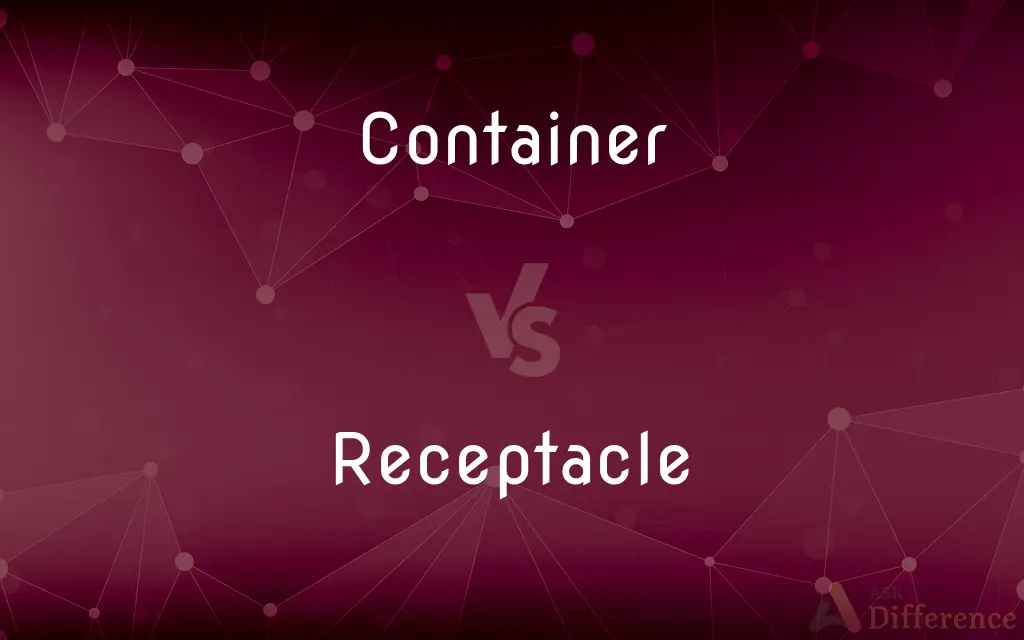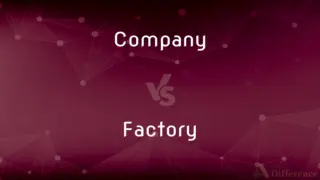Container vs. Receptacle — What's the Difference?
By Fiza Rafique & Urooj Arif — Updated on April 1, 2024
A container is a broad term for any item that can hold materials, often designed for transport or storage, whereas a receptacle is specifically designed to receive and hold items, often for a specific purpose or use.

Difference Between Container and Receptacle
Table of Contents
ADVERTISEMENT
Key Differences
A container is designed to hold, transport, and store various items, making it versatile in its application across industries. This includes everything from shipping containers to storage boxes. On the other hand, a receptacle is often designed with a more specific purpose in mind, such as holding waste in a trash can or electrical plugs in an outlet, limiting its versatility to its intended use.
Containers can be made from a wide range of materials including plastic, metal, glass, and cardboard, depending on their intended use and the level of protection required for their contents. Receptacles, whereas, are usually made from materials best suited to their specific function, such as durable plastics for waste bins or metal for electrical outlets, reflecting their specialized nature.
The design of a container often emphasizes ease of transport and efficiency in stacking and storage, with features such as handles, lids, and flat edges. In contrast, receptacles are designed with their specific use in mind, such as easy access for depositing or withdrawing items, or safety features for electrical receptacles.
Containers are generally used in a broad range of industries and applications, from food storage in kitchens to transporting goods across the globe in shipping containers. Receptacles, on the other hand, are more commonly found in specific settings like homes, offices, and public spaces, serving as collection points for waste, recycling, or electrical connections.
The choice between a container and a receptacle often depends on the specific needs of the user, including the type of items being stored, the desired level of protection, and the context in which they will be used. While containers offer versatility and portability, receptacles provide specialized functionality for specific types of storage or use.
ADVERTISEMENT
Comparison Chart
Purpose
Designed for holding, transporting, and storing a variety of items.
Designed to receive and hold items, often for a specific purpose.
Material
Can be made from plastic, metal, glass, cardboard, etc.
Usually made from materials suited to their specific function (e.g., plastics, metal).
Design
Focuses on transportability, stacking, and storage efficiency.
Focuses on ease of use, safety, and specific functions (e.g., easy access, safety features).
Use Cases
Broad application across industries (food storage, shipping).
Specific settings (waste collection, electrical connections).
Versatility
Highly versatile, adaptable to many uses.
Limited to specific functions or settings.
Compare with Definitions
Container
Any vessel for holding liquids.
She filled the glass container with water.
Receptacle
A container designed for specific items.
The office had a receptacle for recycling paper.
Container
A flexible bag for transport.
The groceries were packed into plastic containers.
Receptacle
An outlet for electrical plugs.
The lamp plugs into the wall receptacle.
Container
A large metal box used for transport.
The shipment arrived in a 20-foot container.
Receptacle
A holder for flowers.
The centerpiece was a beautiful vase acting as a receptacle for fresh flowers.
Container
A receptacle for storing gases under pressure.
The propane gas is stored in a sealed container.
Receptacle
A box for incoming mail.
He checked the mail receptacle for any new letters.
Container
A box for storing goods.
We packed our books into large cardboard containers for the move.
Receptacle
A bin for disposing of waste.
Please throw your trash in the receptacle by the door.
Container
A container is any receptacle or enclosure for holding a product used in storage, packaging, and transportation, including shipping. Things kept inside of a container are protected by being inside of its structure.
Receptacle
A container that holds items or matter.
Container
An object for holding or transporting something
The cakes will keep for up to two weeks if kept in an airtight container
Receptacle
(Botany) The expanded tip of a flower stalk or axis that bears the floral parts or the florets of the flower head.
Container
A receptacle, such as a carton, can, or jar, in which material is held or carried.
Receptacle
(Electronics) A fitting connected to a power supply and equipped to receive a plug.
Container
A large reusable receptacle that can accommodate smaller cartons or cases in a single shipment, designed for efficient handling of cargo.
Receptacle
A container.
Container
Someone who contains; something that contains.
Receptacle
(botany) The part of the flower stalk (peduncle or pedicel) to which the floral parts are attached; a thalamus, a torus.
Container
An item in which objects, materials or data can be stored or transported.
Receptacle
In the Asteraceae (aster or sunflower family), the end of the peduncle to which all of the florets of the flower head are attached.
Container
(transportation) A very large, typically metal, box used for transporting goods.
Receptacle
(phycology) A structure at the end of a branch of an alga containing conceptacles (reproductive organs).
Container
(by extension) Someone who holds people in their seats or in a (reasonably) calm state.
Receptacle
(zoology) An organ that receives and holds a secretion.
Container
(computing) A file format that can hold various types of data.
Receptacle
A contact device installed at an outlet for the connection of an attachment plug (typically by receiving the plug's prongs) to supply portable appliances or equipment.
Container
(object-oriented programming) An abstract data type whose instances are collections of other objects.
Receptacle
That which serves, or is used, for receiving and containing something, as for examople, a basket, a vase, a bag, a reservoir; a repository.
O sacred receptacle of my joys!
Container
Any user interface component that can hold further (child) components.
Receptacle
The apex of the flower stalk, from which the organs of the flower grow, or into which they are inserted. See Illust. of Flower, and Ovary.
Container
(computing) A bundle consisting of operating system, application code and dependencies to be run sandboxed inside a virtualized environment; (by extension) the environment itself.
Receptacle
A container that is used to put or keep things in
Container
One who, or that which, contains; particularly, an artifactual object that is designed to contain some fluid or solid material, object or objects, especially for convenience in transporting the contained objects.
Receptacle
Enlarged tip of a stem that bears the floral parts
Container
A large metallic box designed to hold many smaller boxes or packages, and used for convenience in loading and unloading large quantities of freight, such as on ships, trains, or airplanes.
Receptacle
An electrical (or electronic) fitting that is connected to a source of power and equipped to receive an insert
Container
Any object that can be used to hold things (especially a large metal boxlike object of standardized dimensions that can be loaded from one form of transport to another)
Common Curiosities
What is a container?
A container is any item used to hold, transport, and store various materials, ranging from food products to industrial goods.
Where would you typically find a receptacle?
Receptacles are often found in homes, offices, and public spaces, serving specific functions like collecting waste or facilitating electrical connections.
What materials are used for receptacles?
Receptacles are typically made from materials that suit their specific function, such as durable plastics for waste bins or metal for electrical outlets.
Can a container be a receptacle?
Yes, a container can act as a receptacle if it is specifically designed to hold particular items for a dedicated purpose.
Why choose a container over a receptacle?
One would choose a container for its versatility and ability to transport and store a wide range of items, while a receptacle is chosen for its specific functionality.
What are some examples of containers?
Examples include shipping containers, storage boxes, and liquid storage vessels.
What is a receptacle?
A receptacle is an item designed to receive and hold specific items, often with a particular purpose in mind, such as waste collection or electrical connections.
Can a container be used for liquids and solids?
Yes, containers can be designed to hold both liquids and solids, depending on their construction and material.
What are the common materials for containers?
Containers can be made from plastic, metal, glass, cardboard, and other materials, depending on their intended use.
How does the design of a container differ from that of a receptacle?
Containers are designed for ease of transport and storage efficiency, whereas receptacles are designed based on their specific use, focusing on functionality like safety and accessibility.
Where are containers commonly used?
Containers are used in a wide range of industries, including food storage, shipping, and retail.
Do containers have to be rigid?
No, containers can be rigid or flexible, including boxes, bags, and foldable vessels, depending on their intended use.
What are examples of receptacles?
Examples include trash bins, electrical outlets, and mailboxes.
Is a plastic bag considered a container or a receptacle?
A plastic bag is generally considered a container due to its versatility and use for holding, transporting, and storing items.
Are all receptacles made for disposal purposes?
Not all receptacles are made for disposal; some are designed for storing or collecting specific items, like mail or recyclables.
Share Your Discovery

Previous Comparison
Leek vs. Chive
Next Comparison
Company vs. FactoryAuthor Spotlight
Written by
Fiza RafiqueFiza Rafique is a skilled content writer at AskDifference.com, where she meticulously refines and enhances written pieces. Drawing from her vast editorial expertise, Fiza ensures clarity, accuracy, and precision in every article. Passionate about language, she continually seeks to elevate the quality of content for readers worldwide.
Co-written by
Urooj ArifUrooj is a skilled content writer at Ask Difference, known for her exceptional ability to simplify complex topics into engaging and informative content. With a passion for research and a flair for clear, concise writing, she consistently delivers articles that resonate with our diverse audience.














































